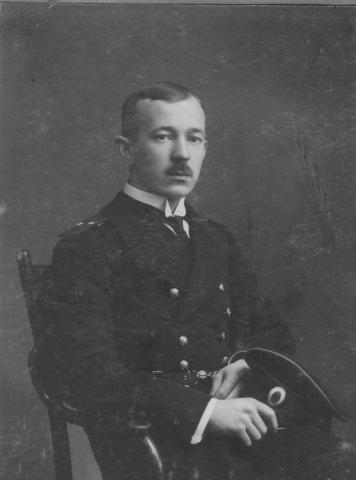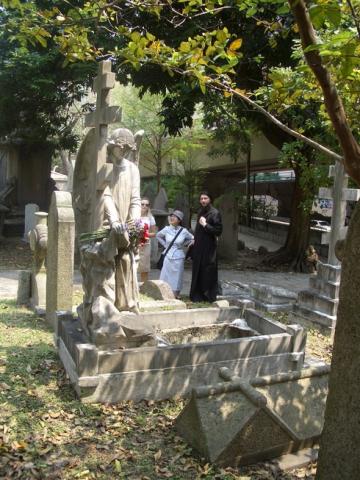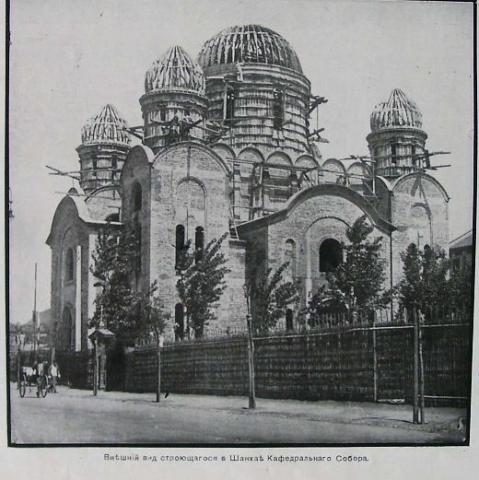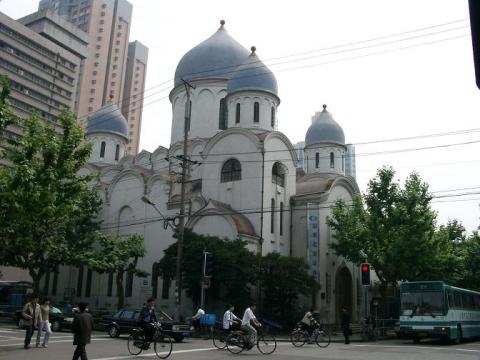This is an unbelievable story about my granduncle Nicholas Belanovsky (Николай Александрович Белановский). He was last heard of in early 1920s and presumed missing for more than eighty years.
I first heard about my granduncle from my father about twenty five years ago. All I knew about Nicholas at that time was that he served in the navy in the Far East. When the Bolsheviks seized power in October 1917, he was one of the few officers, who was not killed by the rebellious sailors, owing to his extraordinary personal qualities. After the Civil War he emigrated to China and wrote a letter to his family, saying that he was alive and well. That was his only and last letter – we have never heard of him ever since.
About twenty years ago, when the borders opened up, I sent a request for information to China about the fate of my relative but received no reply, which was not surprising. My further attempts to find out about Nicholas’s fate yielded no results, which eventually led me to believe that he had been killed in action during the Civil War or died later in China.
In February 2004, I came across an Internet publication by Larisa Chernikova, a historian of the Russian emigration in China from Ufa University, about the construction of an Orthodox cathedral in Shanghai in the mid-1930s. To my great astonishment and joy, I read that one of the people involved in the building of the cathedral was an engineer N.A.Belanovsky. It was no doubt Nicholas! My further investigation eventually led me to the Russian Orthodox priest Rev. Dionisy Pozdnyaev who has a parish in Hong Kong. I sent him an e-mail explaining the goal of my request. He promptly replied to my letter but wrote that he’d never heard this name, promising, however, to let me know if he ever comes across it. Three days later I received another e-mail from Fth. Dionisy, in which he said that he found Nicholas’s grave at the Hong Kong Cemetery! That was a shocking and unbelievable news. A few months later I met Father Dionisy in Moscow where he handed me death certificates for Nicholas Belanovsky and his wife Tatiana.
During the next few years, I applied to various archives and organizations in Russia, Britain and Hong Kong, requesting for information about Nicholas Belanovsky. Based on the facts that I have in my possession now, I have managed to reconstruct Nicholas's biography, which, however, still has many gaps.
My granduncle Nicholas Belanovsky was born in April 1889 into the family of a Russian nobleman Alexander Belanovsky, an extraordinary person and enthusiastic clock-maker, who founded the first government clock-making school in St Petersburg in the very beginning of the 20th century. Nicholas graduated from the Naval Cadet Corps (Academy) and wanted to continue his education at the Polytechnic University in St Petersburg but didn’t have enough money to finish it. However, the qualification he received there helped him enormously many years later. At the outbreak of the First World War in August 1914, he was sent to serve in the Baltic Fleet, and a year later was transferred as midshipman to the Amur River Fleet in the Far East. Shortly before the February Revolution of 1917, he married a young lady. All I know about her is that her name was Tatiana and that before marrying my granduncle, she had been first married to a gun-maker Popov from Tula, but all my attempts to establish her maiden name have failed.
The Bolshevik revolution and the Civil War found Nicholas and his wife in the Far East. The sailors supported the Bolsheviks and killed many officers. Nicholas, as I said earlier, was a man of extraordinary personal qualities, which, I believe was the major reason why the rebels didn’t murder him. Until 1919 he served with the Bolshevik sailors and was highly respected by them for his very high qualification and, I believe, for his kindness.
In the summer of 1919 the Japanese captured the fleet and Nicholas was forced to leave the ship. The Kolchak authorities wanted to execute Nicholas for supporting the Bolsheviks but some of his friends intervened and the investigators left him alone. With the defeat of Admiral Kolchak in 1920, he was again admitted to the Bolshevik fleet and served there until the end of 1921. The atmosphere in the fleet was absolutely terrible, most of the sailors were anarchists and didn’t obey anyone, even the Bolsheviks. As a result, Nicholas defected to the White Guards. I don’t know when exactly he emigrated to China, but most likely he fled from Vladivostok to Shanghai in 1922 aboard the Admiral Stark fleet. According to the records I received from HK Public Records Office, by 1924 Nicholas had worked for the Shanghai-based Yee Tsoong Tobacco Company, an affiliate of the British Cigarette
Company. Between 1933-1935 he worked in Shanghai where he participated in the construction of an Orthodox Cathedral, one of the biggest and most beautiful Russian churches in China. Between 1939 and 1942 he resided in Hong Kong, but it was only after 1948 that he settled down there forever and was eventually granted British citizenship. The British-American Tobacco Company gave Nicholas Belanovsky best references, stating, in particular, that “his transfer to Hong Kong is that he may undertake the supervising of the erection of new buildings, to be used as godowns, adjoining our Hong Kong factory. He is urgently needed here and unless he arrives very soon, our plans for building will be delayed.” His wife died in May 1950 of myocardial degeneration. Nicholas died on 21 May,1977 in Queen Elizabeth Hospital of bronchial pneumonia.
This is all I know to date about my granduncle Nicholas Belanovsky. The only thing that left after him is his photo that he once presented to his brother’s wife Alina in 1915 as if forefeeling that he wouldn’t see any of them again.
Although many years have passed since Nicholas's death, I'm still hopeful that some people who were familiar with him are still alive and could tell me more about him. His friend, Mrs. Miu-Ying-Lau, who had buried Nicholas died while her relative Mrs Alsa Mak who replied to my letter, said she knew very little about Nicholas and was not helpful. I applied to various organizations, including BAT's China and HK branches and Queen Elizabeth Hospital but all of them had destroyed records that could give me more clues for my investigation.
Nicholas's last place of residence in Hong Kong was 242, 2/F Fa Yuen Street Kowloon.
Contact information:
Dmitry Belanovsky
Moscow
E-mail: dbelanovsky@gmail.com




Comments
I am assuming that the PRO
I am assuming that the PRO sent you these two cards from the Carl Smith Collection:
http://www.orthodox.cn/contemporary/hongkong/index_en.html
"The original parish of Ss Peter & Paul was located at 12 Essex Crescent, Kowloon Tong, and eventually closed in 1972 shortly after the repose of its rector Fr Dmitry Uspensky in 1970, who faithfully served in Hong Kong since his arrival in 1933."
[this was much closer to Mong Kok in Kowloon]
You have already been in touch with Fr Dionisy Pozdnyaev, who is the current priest at the Ss Peter & Paul on Hong Kong Island. If the Belanovskys were church members, perhaps there are old member records for them.
242 Fa Yuen Street was completed in 1972, so the building, now called Oscar Court and painted a pink colour, is the same one he lived in. http://maps.google.com/maps?q=242+Fa+Yuen+Street+Kowloon.&ll=22.325028,… It is on the "green" end of Mong Kok.
Search the Land Register to see if he owned the flat. (you can buy them online - they cost HK$25 each. Get the "complete" version) https://www2.iris.gov.hk/eservices/byaddress/result.jsp?__fbsID=1315741…
Nicholas Belanovsky
Thank you very much for your advice and the photo of Nicholas' last place of residence! Yes, I did get these cards and other records from PRO. What's most important for me is finding someone who might have remembered him, though I understand that the chances are almost zero.
re: Nicholas Belanovsky
Dear Dmitry,
That's a tough one.
Has anyone seen any research on the local Russian community? Here are a few links I can find, but it's not much:
There is a current 'Russian Club Hong Kong'. No idea if any of their members are connected to Russian families that have lived in Hong Kong for several decades, but could be worth a try.
Could you make a notice looking for families that have lived here since the 1950s-70s, and ask the Russian Orthodox Priest to display it on the church noticeboard?
Do you know where Nicholas spent the wartime years, 1941-45? If he was interned in Asia, it would be worth investigating any society that is gathering information about that internment camp.
Which years was he working at British American Tobacco in Hong Kong?
Regards, David
Dear Dmitry,
Dear Dmitry,
There is a Facebook group calls White Russian Emigres from China for people whose parents or grandparents were in China and Hong Kong after fleeing Russia during the Revolution. Someone may know Nicolas Belanovsky
If you are not at FB, I can ask for you